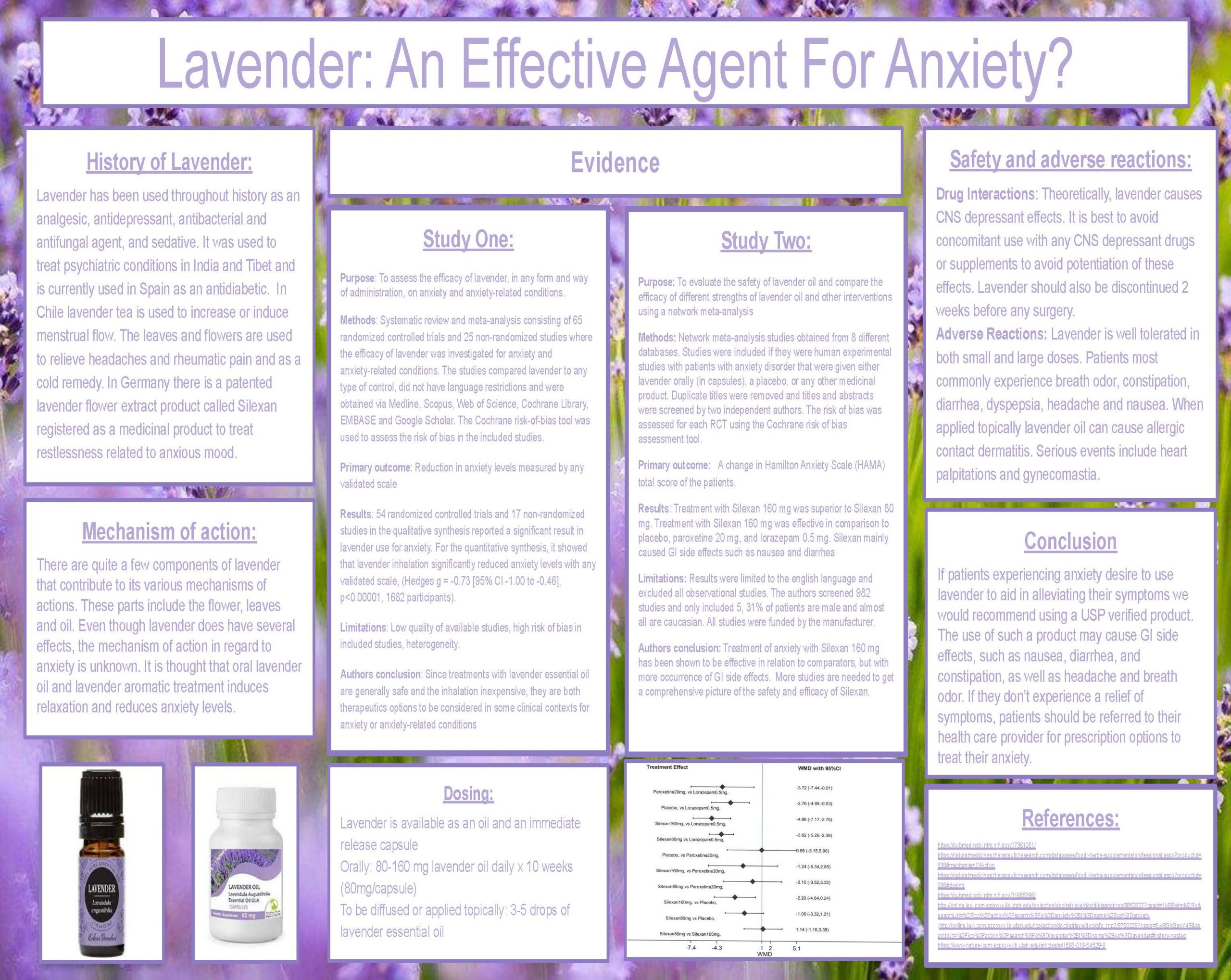Lavender: An Effective Agent For Anxiety?
Background
Lavender has been used throughout history as an analgesic, antidepressant, antibacterial and
antifungal agent, and sedative. It was used to treat psychiatric conditions in India and Tibet and
is currently used in Spain as an antidiabetic. In Chile lavender tea is used to increase or induce
menstrual flow. The leaves and flowers are used to relieve headaches and rheumatic pain and
as a cold remedy. In Germany there is a patented lavender flower extract product called Silexan
registered as a medicinal product to treat restlessness related to anxious mood.
Mechanism of Action
There are quite a few components of lavender that contribute to its various mechanisms of
actions. These parts include the flower, leaves and oil. Even though lavender does have several
effects, the mechanism of action in regard to anxiety is unknown. It is thought that oral lavender
oil and lavender aromatic treatment induces relaxation and reduces anxiety levels.
Side Effects
Lavender is well tolerated in both small and large doses. Patients most commonly experience
breath odor, constipation, diarrhea, dyspepsia, headache and nausea. When applied topically
lavender oil can cause allergic contact dermatitis. Serious events include heart palpitations and
gynecomastia.
Drug Interactions
Theoretically, lavender causes CNS depressant effects. It is best to avoid concomitant use with
any CNS depressant drugs or supplements to avoid potentiation of these effects.
Clinical Evidence
A systematic review and meta-analysis was conducted by Davide Donelli and colleagues to
determine the effects of lavender on anxiety. The primary outcome was a reduction in anxiety
levels measured by any validated scale. 54 randomized controlled trials and 17 non-randomized
studies in the qualitative synthesis reported a significant result in lavender use for anxiety. For
the quantitative synthesis, it showed that lavender inhalation significantly reduced anxiety levels
with any validated scale, (Hedges g = -0.73 [95% CI -1.00 to -0.46], p<0.00001, 1682
participants). The authors concluded that since treatments with lavender essential oil are
generally safe and the inhalation inexpensive, they are both therapeutics options to be
considered in some clinical contexts for anxiety or anxiety-related conditions.
A network meta-analysis studies obtained from 8 different databases to evaluate the safety of
lavender oil products and compare the efficacy of different strengths of lavender and other
interventions. The efficacy was evaluated using changes in the Hamilton Anxiety Scale (HAMA)
total score of the patients. They concluded that treatment of anxiety with Silexan 160 mg has
been shown to be effective in relation to comparators, but with more occurrence of GI side
effects, but more studies are needed to get a comprehensive picture of the safety and efficacy
of Silexan.
Conclusion
If patients experiencing anxiety desire to use lavender to aid in alleviating their symptoms we
would recommend using a USP verified product. The use of such a product may cause GI side
effects, such as nausea, diarrhea, and constipation, as well as headache and breath odor. If
they don’t experience a relief of symptoms, patients should be referred to their health care
provider for prescription options to treat their anxiety.




Responses
What did the first study compare lavender oil to?
What are your thoughts regarding the efficacy of lavender inhalation vs lavender PO?
Great job on the poster!
Hi Dixie, thanks for your question! In the systematic review and meta-analysis, the RCTs that included lavender oil taken by mouth were compared to any type of control. This included placebo, lorazepam, and paroxetine. Additionally, one of the studies did not use any type of intervention. In the RCTs where lavender oil was administered through inhalation, it was compared to usual care, tea tree oil, placebo, peppermint oil as well as no intervention.
In comparing the efficacy of lavender inhalation vs lavender taken orally, I would say there is a bit of bias regarding the two. For one, with lavender inhalation, the smell is very hard, if not impossible to disguise, which could lead to performance bias. Unfortunately, quite a few of the studies included in this systematic review had high overall risk of bias. To have a better understanding of the true efficacy of lavender inhalation and lavender taken orally, higher quality studies need to be conducted.
Nice colors in the poster. In the first meta-analysis did all the studies included use inhalation administration? In the second study, did the authors state response and remission scores pre and post treatment? Would you recommend its use – and if so, in what form?
Hi Dr. Shane-McWhorter, thank you for your question! I’ll let Jenni address the question about the first study, as she is more familiar with it. As for the second study, the authors stated that Silexan 160 mg produced a higher decline in HAMA score (-1.14) relative to Silexan 80 mg. The decline for Silexan 80 mg was similar to that of paroxetine 20 mg, which was -3.72. The authors did not state any scores associated with either pre or post treatment, just the difference in scores. Currently, the lavender product with the most studies is Silexan, but this is not approved yet in the US. As it is not available, I would not recommend the use of it or any other (less studied) lavender to treat a diagnosed anxiety disorder.
Hi Dr. Shane-McWhorter, thanks for the question! In regard to the first study, all studies did not administer lavender oil via inhalation. A few of the studies did include lavender capsules taken by mouth.
Nice poster. What dose of lavender was used in the studies? You listed the dose on the poster – but do all the studies use the same amount? Are their toxic effects if a patient consumes too much?
Hi Dr. Malone! In the meta analysis done for the second study, all five of the studies used the product Silexan in doses of either 80 or 160 mg. Adverse events at those doses consist of nausea, breath odor, dyspepsia, headache, diarrhea, oral discomfort, and naso-pharanygitis, which were all mild symptoms and occurred in a small subset of patients. One study found a more serious side effect of gastritis in 1% of the patients treated with 80 mg Silexan once daily, but this did not occur in the other four studies.
For the systematic review and meta analysis, multiple doses were used in the included studies. For example, one study used doses of 10mg, 40mg and 80mg (all taken by mouth). Other studies that included lavender via inhalation used concentrations of lavender oil. This included 2%, 5%, 10% and 100%. These could also be diluted in such things as water, almond oil and grapeseed oil.
Unfortunately in the systematic review and meta-analysis, adverse effects were not included in all of the studies and most of the studies included adults, not children. The main adverse effects reported were headaches, palpitations, infections and gastrointestinal disorders. I would caution on the use of anything over the recommended dose for adults and avoid oral use in children to prevent any type of toxicity.
All, In our study study, we learned that hops potentially act on GABA-a receptors which is likely responsible for its anxiolytic effects. Did you read anywhere in your research that lavender could act on GAGA-a receptors. Just curious!
Hey Derek! There have been a few individual studies that have reported that lavender may work on GABA-A receptors to induce its anxiolytic effects, but there is not enough evidence to know for sure that that is how it works. Thanks for your question!
I love lavender! This is a great topic. Did your studies use lavender capsules? I think it would be hard to use the oil if the study was blinded.
Hi Jennie, thanks for the question! Some studies that were included did use lavender capsules that were taken by mouth. Side note, I also love lavender!
Hi guys, nice poster and I love the topic. I also wanted to look at lavender and it’s uses in anxiety. After studying it, would either of you consider taking lavender for anxiety?
Hi Jackie! If The oral capsules used in the studies on our poster are not available in US, but if they were and I was experiencing mild symptoms of anxiety I would consider using lavender to help reduce those symptoms. However, if the symptoms were more moderate or severe I wouldn’t use lavender and would instead see a medical professional.
Hello Jenni and Tera!
How long does lavender take to start working for anxiety between the different formulations? (capsule vs. inhalation)
Hi Ryley! The second study included studies that lasted anywhere from 9 to 12 weeks, but did not assess the HAMA score at any time other than the beginning and end of the study. Therefore we can infer that the effects don’t take longer than 9 to 12 weeks to appear. I was not able to find any reputable studies on the inhaled form of lavender, which makes it difficult to assess its effectiveness and how long it takes to feel the effects of it, if the patients ever do.
Hi Jenni
Thank you for sharing your expertise involving lavender to treat anxiety. Great topic and a topic that comes up during pharmacy work time! I knew your poster would have some purple in it!! Really liked the color schemes! It seems like the studies involving lavender have utilized the oil with less study on other formulations. Thank you for sharing your expertise on this evolving topic!! (Be sure to add your name to your poster!)
Comments are closed.